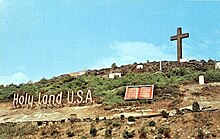
Splendor in the Grass is a 1961 American period drama film produced and directed by Elia Kazan, from a screenplay written by William Inge. It stars Natalie Wood and Warren Beatty as two high school sweethearts, navigating feelings of sexual repression, love, and heartbreak. Pat Hingle, Audrey Christie, Barbara Loden, Zohra Lampert, and Joanna Roos are featured in supporting roles.
Cinéma vérité is a style of documentary filmmaking developed by Edgar Morin and Jean Rouch, inspired by Dziga Vertov's theory about Kino-Pravda. It combines improvisation with use of the camera to unveil truth or highlight subjects hidden behind reality. It is sometimes called observational cinema, if understood as pure direct cinema: mainly without a narrator's voice-over. There are subtle, yet important, differences between terms expressing similar concepts. Direct cinema is largely concerned with the recording of events in which the subject and audience become unaware of the camera's presence: operating within what Bill Nichols, an American historian and theoretician of documentary film, calls the "observational mode", a fly on the wall. Many therefore see a paradox in drawing attention away from the presence of the camera and simultaneously interfering in the reality it registers when attempting to discover a cinematic truth.

Paris, Texas is a 1984 neo-Western drama road film directed by Wim Wenders, co-written by Sam Shepard and L. M. Kit Carson, and produced by Don Guest. It stars Harry Dean Stanton, Nastassja Kinski, Dean Stockwell, Aurore Clément, and Hunter Carson. In the film, disheveled recluse Travis Henderson (Stanton) reunites with his brother Walt (Stockwell) and son Hunter (Carson). Travis and Hunter embark on a trip through the American Southwest to track down Travis's missing wife, Jane (Kinski).

Donn Alan Pennebaker was an American documentary filmmaker and one of the pioneers of direct cinema. Performing arts and politics were his primary subjects. In 2013, the Academy of Motion Picture Arts and Sciences recognized his body of work with an Academy Honorary Award. Pennebaker was called by The Independent as "arguably the pre-eminent chronicler of Sixties counterculture".

Blood Work is a 2002 American mystery thriller film starring and directed by Clint Eastwood, who also produced. It co-stars Jeff Daniels, Wanda De Jesús, and Anjelica Huston. It is based on the 1998 novel of the same name by Michael Connelly.

Patty Hearst is a 1988 American biographical film crime drama directed by Paul Schrader and stars Natasha Richardson as Hearst Corporation heiress Patricia Hearst and Ving Rhames as Symbionese Liberation Army leader Cinque. It is based on Hearst's 1982 autobiography Every Secret Thing, which was later rereleased as Patty Hearst – Her Own Story.

Barbara Cupisti is an Italian director and actress. As a director, she focuses mainly on human rights documentaries.

Blues in the Night is a 1941 American musical in the film noir style directed by Anatole Litvak and starring Priscilla Lane, Richard Whorf, Betty Field, Lloyd Nolan, Elia Kazan, and Jack Carson. It was released by Warner Brothers. The project began filming with the working title Hot Nocturne, the play upon which it is based, but was eventually named after its principal musical number "Blues in the Night", which became a popular hit. The film was nominated for a Best Song Oscar for "Blues in the Night".

Barbara Sukowa is a German actress of screen and stage and singer. She has received three German Film Awards for Best Actress, three Bavarian Film Awards, Cannes Film Festival Award for Best Actress, Venice Film Festival Award, as well as nominations for European Film Awards, César Awards and Grammy Awards.

Blood Bath is a 1966 American horror film directed by Jack Hill and Stephanie Rothman and starring William Campbell, Linda Saunders, Marissa Mathes, and Sid Haig. The film concerns a mad painter of weird art who turns into a vampire-like man by night, apparently as a result of a family curse, and believes that he has found his reincarnated mistress in the person of an avant-garde ballerina.
Maitland McDonagh is an American film critic, writer-editor and podcaster. She is the author of Broken Mirrors/Broken Minds: The Dark Dreams of Dario Argento (1991) and other books and articles on horror and exploitation films, as well as about erotic fiction and erotic cinema. In 2022, McDonagh was inducted into the Rondo Hatton Classic Horror Awards' Monster Kid Hall of Fame. She is the founder of the small press 120 Days Books, which became an imprint of Riverdale Avenue Books.
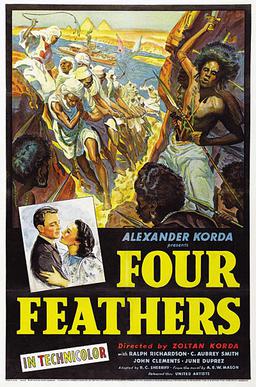
The Four Feathers is a 1939 British Technicolor adventure film directed by Zoltan Korda, starring John Clements, Ralph Richardson, June Duprez, and C. Aubrey Smith. Set during the reign of Queen Victoria, it tells the story of a man accused of cowardice and his efforts to redeem his name. It is widely regarded as the best of the numerous film adaptations of the 1902 novel of the same name by A.E.W. Mason.
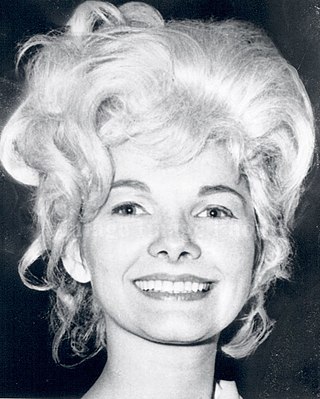
Barbara Ann Loden was an American actress and director of film and theater. Richard Brody of The New Yorker described Loden as the "female counterpart to John Cassavetes".
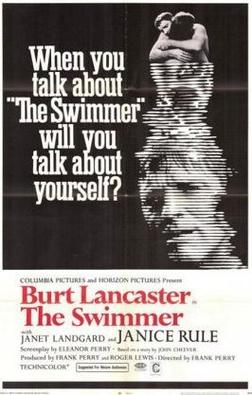
The Swimmer is a 1968 American surrealist-drama film starring Burt Lancaster. The film was written and directed by Academy Award-nominated husband-and-wife team of Eleanor Perry and Frank Perry (director). The story is based on the 1964 short story "The Swimmer" by John Cheever, which appeared in the July 18, 1964, issue of The New Yorker. The 95-minute movie adds new characters and scenes consistent with those in the original 12-page short story.

Tracks is a 1976 American drama film written and directed by Henry Jaglom and starring Dennis Hopper, Taryn Power and Dean Stockwell. The story involves a returned Vietnam veteran escorting a fellow soldier's coffin across the United States for burial.

Cisco Pike is a 1971 American drama film that was written and directed by Bill L. Norton, and released by Columbia Pictures. The film stars Kris Kristofferson as a musician who, having fallen on hard times, turns to the selling of marijuana and is blackmailed by a police officer.
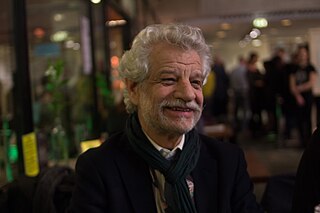
Thomas Elsaesser was a German film historian and professor of Film and Television Studies at the University of Amsterdam. He was also the writer and director of The Sun Island, a documentary essay film about his grandfather, the architect Martin Elsaesser. He was married to scholar Silvia Vega-Llona.

A Quiet Place in the Country is a 1968 giallo thriller film directed by Elio Petri, and starring Franco Nero and Vanessa Redgrave. Based on the short story "The Beckoning Fair One" by Oliver Onions, its plot follows an artist who relocates to a rural villa with his girlfriend, where he begins to experience increasingly terrifying, apparently supernatural events.

Frances Ha is a 2012 American black-and-white comedy-drama film directed by Noah Baumbach. It is written by Baumbach and Greta Gerwig, who also stars as Frances Halladay, a struggling 27-year-old dancer. The film premiered at the Telluride Film Festival on September 1, 2012, and was given a limited theatrical release in the United States on May 17, 2013, by IFC Films.

Roma is a 2018 drama film written and directed by Alfonso Cuarón, who also produced, shot, and co-edited it. Set in 1970 and 1971, Roma follows the life of a live-in indigenous (Mixteco) housekeeper of an upper-middle-class Mexican family, as a semi-autobiographical take on Cuarón's upbringing in the Colonia Roma neighborhood of Mexico City. The film stars Yalitza Aparicio and Marina de Tavira in the leading roles. It is an international co-production between Mexico and the United States.

